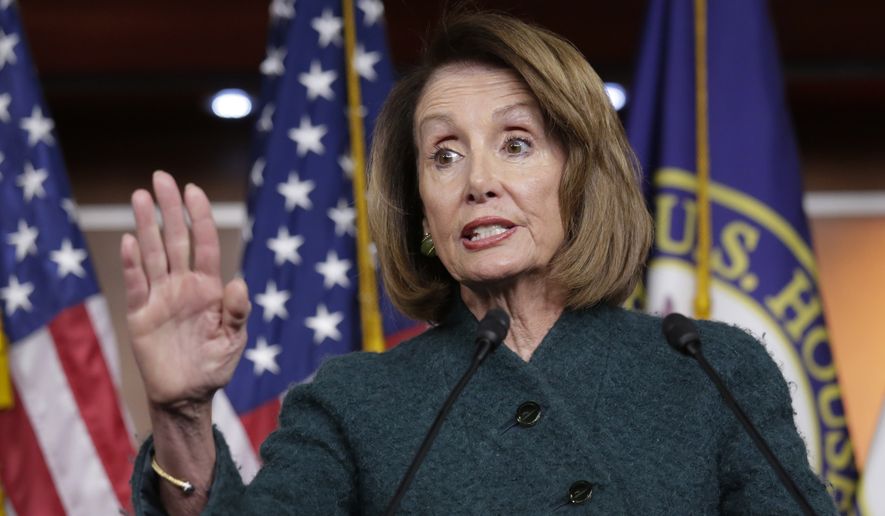Even if the wall debate is resolved, it’s not necessarily the end of the shutdown that has gone well into its fourth week.
Lawmakers said plenty of other lingering questions are tucked inside the spending bills, including abortion policy, immigration detention — even horse slaughter inspections — all of which will complicate the fight.
Border security is the big hurdle, but those other issues are still “major concerns,” said Rep. John Moolenaar, Michigan Republican.
Indeed, the White House has already signaled a veto on the kinds of bills House Democrats powered through their chamber last week. He said they overspend the president’s targets and include provisions he would never accept, including reversing the Mexico City Policy that prevents taxpayers from funding international groups that deal in abortions.
Meanwhile, House Republican members also object to passing the spending bills approved last year in the Republican-controlled Senate, saying Democrats are spinning their wheels amid White House opposition.
“Even if we had a deal on the border wall, we don’t agree to the Senate appropriations bills,” said Rep. Bradley Byrne, Alabama Republican.
Democrats’ strategy over the past couple of weeks of the shutdown has been to refuse negotiations. They insist that an immediate path to reopening the government is to adopt the spending bills senators wrote last year on a bipartisan basis.
Although written in a Republican-led Senate, the bills tilt on issues like abortion politics more toward Democrats’ whims than Republicans’.
Democrats say that makes them a good basis for compromise and point out that many of them passed the Senate with hardly any opposition.
Speaker Nancy Pelosi said Democrats are telling Republicans to “take yes for an answer” by passing the Senate bills.
“We did exactly what you Republican senators wrote. Now take yes for an answer and pass your own bill that you’ve already passed once again,” Mrs. Pelosi said.
Senate Republicans say one goal at the time they approved the bills was to get them into House-Senate conferences, where they expected liberal-leaning provisions to be deleted in the face of presidential veto threats.
Now, however, with Democrats in control of the House, it’s not clear what other fights could develop should the bills go back into conference.
Democrats could, for example, force a fight over the Trump administration’s intention to add a question on citizenship into the 2020 census.
Still, Rep. Jose E. Serrano, the New York Democrat who chairs the subcommittee with oversight over Census Bureau spending, said he figures those could come together quickly.
“You resolve the wall, and everything will fly through — honestly,” Mr. Serrano said.
He pointed out that House Democrats will soon get another chance to put their stamp on spending bills with the 2020 budget process about to start.
“I think we’re more interested in making sure that going forward the bills reflect our values — what we stand for — including the citizenship question and other things,” he said. “Not just in dollars, but in language.”
Other potential hiccups this year include perennials such as whether the government should allow federal inspections of facilities that slaughter horses intended for human consumption. Without inspections, the meat can’t be sold — and animal rights activists battle every year for that to happen.
“We still have a disagreement between the Senate version and the House version, but it’s something I think if we felt like we had to come to a resolution, we would find some common ground,” said Rep. Robert B. Aderholt, Alabama Republican.
Mr. Byrne said negotiators, led by Senate Appropriations Chairman Richard C. Shelby, Alabama Republican, have been working on compromises they believe can pass both chambers and be signed by Mr. Trump. Those compromises differ from what the Senate passed last year.
“I’ve talked to Sen. Shelby about this myself — he’s done a lot of work to resolve all these issues, and I don’t see why the Senate would accept those bills after they’ve done all this work to work things out between the House and the Senate,” said Mr. Byrne.
Rep. Adam Smith, Washington Democrat and chairman of the House Armed Services Committee, said lawmakers could always pass another short-term continuing resolution that would reopen the shuttered agencies and then take about a week to iron out the other outstanding issues.
“We can open it like that,” he said, snapping his fingers. “That doesn’t necessarily mean we have appropriations bills.”
Rep. Michael K. Simpson, Idaho Republican, said he can’t imagine Mr. Trump signing a final spending package that undermines the administration’s policies on abortion and that he didn’t think the language would be included in a House-Senate compromise version.
Mr. Simpson and other appropriations committee members said negotiators had been working to reconcile the House and Senate versions of the outstanding spending bills and that the six bills not part of the Homeland Security Department were all but finished before the wall debate upended the process.
He said House Democrats’ push to simply pass the Senate’s spending bills should trouble Republican and Democratic appropriators alike.
“House priorities — Republican and Democrat — are ignored,” he said. “That’s why it’s easy to vote against these. We might as well not even have an appropriations committee in the House if this is what we’re going to do.”
• David Sherfinski can be reached at dsherfinski@washingtontimes.com.




Please read our comment policy before commenting.